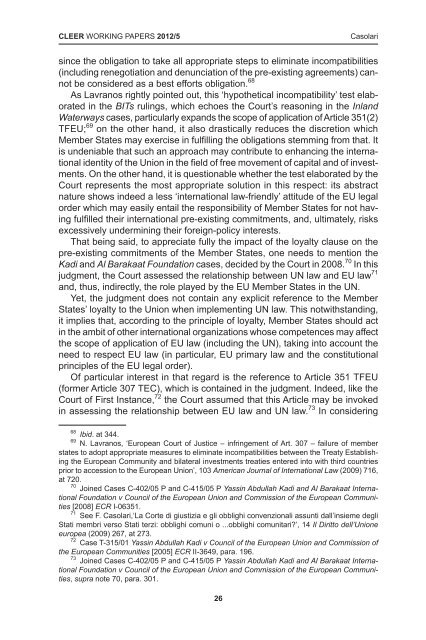Principles and practices of EU external representation - TMC Asser ...
Principles and practices of EU external representation - TMC Asser ...
Principles and practices of EU external representation - TMC Asser ...
Create successful ePaper yourself
Turn your PDF publications into a flip-book with our unique Google optimized e-Paper software.
CLEER WORKING PAPERS 2012/5<br />
Casolari<br />
since the obligation to take all appropriate steps to eliminate incompatibilities<br />
(including renegotiation <strong>and</strong> denunciation <strong>of</strong> the pre-existing agreements) cannot<br />
be considered as a best efforts obligation. 68<br />
As Lavranos rightly pointed out, this ‘hypothetical incompatibility’ test elaborated<br />
in the BITs rulings, which echoes the Court’s reasoning in the Inl<strong>and</strong><br />
Waterways cases, particularly exp<strong>and</strong>s the scope <strong>of</strong> application <strong>of</strong> Article 351(2)<br />
TF<strong>EU</strong>; 69 on the other h<strong>and</strong>, it also drastically reduces the discretion which<br />
Member States may exercise in fulfilling the obligations stemming from that. It<br />
is undeniable that such an approach may contribute to enhancing the international<br />
identity <strong>of</strong> the Union in the field <strong>of</strong> free movement <strong>of</strong> capital <strong>and</strong> <strong>of</strong> investments.<br />
On the other h<strong>and</strong>, it is questionable whether the test elaborated by the<br />
Court represents the most appropriate solution in this respect: its abstract<br />
nature shows indeed a less ‘international law-friendly’ attitude <strong>of</strong> the <strong>EU</strong> legal<br />
order which may easily entail the responsibility <strong>of</strong> Member States for not having<br />
fulfilled their international pre-existing commitments, <strong>and</strong>, ultimately, risks<br />
excessively undermining their foreign-policy interests.<br />
That being said, to appreciate fully the impact <strong>of</strong> the loyalty clause on the<br />
pre-existing commitments <strong>of</strong> the Member States, one needs to mention the<br />
Kadi <strong>and</strong> Al Barakaat Foundation cases, decided by the Court in 2008. 70 In this<br />
judgment, the Court assessed the relationship between UN law <strong>and</strong> <strong>EU</strong> law 71<br />
<strong>and</strong>, thus, indirectly, the role played by the <strong>EU</strong> Member States in the UN.<br />
Yet, the judgment does not contain any explicit reference to the Member<br />
States’ loyalty to the Union when implementing UN law. This notwithst<strong>and</strong>ing,<br />
it implies that, according to the principle <strong>of</strong> loyalty, Member States should act<br />
in the ambit <strong>of</strong> other international organizations whose competences may affect<br />
the scope <strong>of</strong> application <strong>of</strong> <strong>EU</strong> law (including the UN), taking into account the<br />
need to respect <strong>EU</strong> law (in particular, <strong>EU</strong> primary law <strong>and</strong> the constitutional<br />
principles <strong>of</strong> the <strong>EU</strong> legal order).<br />
Of particular interest in that regard is the reference to Article 351 TF<strong>EU</strong><br />
(former Article 307 TEC), which is contained in the judgment. Indeed, like the<br />
Court <strong>of</strong> First Instance, 72 the Court assumed that this Article may be invoked<br />
in assessing the relationship between <strong>EU</strong> law <strong>and</strong> UN law. 73 In considering<br />
68 Ibid. at 344.<br />
69 N. Lavranos, ‘European Court <strong>of</strong> Justice – infringement <strong>of</strong> Art. 307 – failure <strong>of</strong> member<br />
states to adopt appropriate measures to eliminate incompatibilities between the Treaty Establishing<br />
the European Community <strong>and</strong> bilateral investments treaties entered into with third countries<br />
prior to accession to the European Union’, 103 American Journal <strong>of</strong> International Law (2009) 716,<br />
at 720.<br />
70 Joined Cases C-402/05 P <strong>and</strong> C-415/05 P Yassin Abdullah Kadi <strong>and</strong> Al Barakaat International<br />
Foundation v Council <strong>of</strong> the European Union <strong>and</strong> Commission <strong>of</strong> the European Communities<br />
[2008] ECR I-06351.<br />
71 See F. Casolari,‘La Corte di giustizia e gli obblighi convenzionali assunti dall’insieme degli<br />
Stati membri verso Stati terzi: obblighi comuni o ...obblighi comunitari?’, 14 Il Diritto dell’Unione<br />
europea (2009) 267, at 273.<br />
72 Case T-315/01 Yassin Abdullah Kadi v Council <strong>of</strong> the European Union <strong>and</strong> Commission <strong>of</strong><br />
the European Communities [2005] ECR II-3649, para. 196.<br />
73 Joined Cases C-402/05 P <strong>and</strong> C-415/05 P Yassin Abdullah Kadi <strong>and</strong> Al Barakaat International<br />
Foundation v Council <strong>of</strong> the European Union <strong>and</strong> Commission <strong>of</strong> the European Communities,<br />
supra note 70, para. 301.<br />
26

















